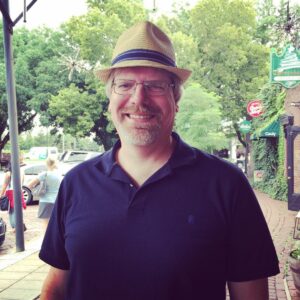UW-Green Bay
Associate Professor
Humanistic Studies
Hello! You can call me “Clif”. I am Associate Professor of History, Humanities, and Global Studies at UW Green Bay. I earned my BA, MA, and PhD in History from SUNY at Buffalo, and my research and teaching interests include German and European history and culture, American history and culture, science fiction, and jazz. I love teaching, and I have been recognized for my achievements with the UWGB’s Founder’s Award for Excellence in Teaching in 2010 and the UW Board of Regents Teaching Excellence Award in 2014. Most recently, I served as UW Green Bay’s Associate Provost for Academic Affairs, in which I oversaw the University’s Accreditation, led Project Coastal, and contributed to numerous projects such as Turbocharge, student success, teaching and learning, international education, and civic engagement. After six years as Associate Provost, I returned to the faculty in 2021 to pursue my love of teaching, and I am currently studying radical politics in Germany and the United States in the 1920s.
Teaching and Learning Philosophy
My primary goal in teaching is to convey to students the political, social, and cultural values of a people at a given moment in time, often by employing comparative historical methods. In addition, I am interested in demonstrating to students how cultural artifacts, ranging from memoirs and political documents to literature, art, and music, reflect the culture in which they were created. Ultimately, I hope my students take from this experience an interest in how their own culture reflects their own values. I favor an interdisciplinary approach to teaching and learning. I try to approach my topic from multiple different disciplinary perspectives, allowing my students to think about the ways that different disciplines view a particular topic. Most often, these disciplines are in the humanities – history, philosophy, literature, art, music, and so on – but I do try to introduce interesting perspectives from outside the humanities when possible. I also have been known to employ popular culture, such as comic books. Nor do I limit myself to written sources; I incorporate art, music, and film into my courses whenever possible. In fact, I almost always start class with a selection of music or video (the “music of the day”). My courses, especially upper-level courses, are student-centered. I rarely lecture in such courses and always start by inviting students to ask questions or point out significant and interesting passages in the texts they have read. In this way, students become responsible for, and take ownership of, the material of the course. While I always have questions prepared should conversation lag, I find that students are often excited to be given control of the course content. While I as the professor do have to take a certain responsibility for the course, I try to treat my students as intellectual equals. I find that this creates a productive and invigorating learning environment and encourages students to become historians themselves.

